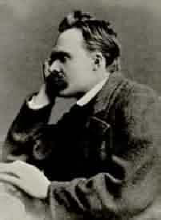Friedrich Nietzsche (1844–1900) was a German-Swiss philosopher whose work did not become influential until the 20th century. He argued that truth is impossible—there can only be perspective and interpretation, driven by a person’s interests or ‘will to power’.

‘Everything is subjective [for example, a figment of your reasoning mind],’ you say; but even this is interpretation. The ‘subject’ is not something given, it is something added and invented … [Is] it necessary to posit an interpreter behind the interpretation? …
In so far as the word ‘knowledge’ has any meaning, the world is … interpretable, otherwise it has no meaning behind it, but countless meanings—‘Perspectivism’.
It is our needs that interpret the world; our drives … Every drive is a kind of list to rule; each one has its perspective that it would like to compel all the other drives to accept as a norm.
[D]eception, flattering, lying and cheating, talking behind the back, posing, living in borrowed splendor, being masked, the disguise of convention, acting a role before others and before oneself—in short, the constant fluttering around the single flame of vanity is so much the rule and the law that almost nothing is more incomprehensible than how an honest and pure urge for truth could have arisen among men. They are deeply immersed in illusions and dream images; their eye only glides only over the surface of things … their feeling nowhere leads into truth, but contents itself with the reception of stimuli, playing, as it were, a game of blind man’s bluff …
The true world is unattainable, it cannot be proved, it cannot promise anything.
You are aware of my demand upon philosophers, that they should take up a stand Beyond Good and Evil … This demand is the result of a point of view which I was the first to formulate: that there are no such things as moral facts. Moral judgment has this in common with the religious one, that it believes in realities which are not real. Morality is only an interpretation of certain phenomena: or, more strictly speaking, a misinterpretation of them. … [M]oral judgment must never be taken quite literally: as such is sheer nonsense. As a sign code, however, it is invaluable: to him at least who knows, it reveals the most valuable facts concerning cultures …
Nietzsche, Friedrich. 1901 (1968). The Will to Power. New York: Vintage Books. p. 267.
—. 1873 (1954). ‘On Truth and Lies in the Nonmoral Sense.’ in The Portable Nietzsche, edited by Walter Kaufmann. New York: Viking Press. p. 45.
—. 1888 (1915). ‘Twilight of the Idols.’ in Complete Works of Friedrich Nietzsche, edited by Oscar Levy. Edinburgh: T.N. Foulis. pp. 24, 44. ||Amazon || WorldCat
